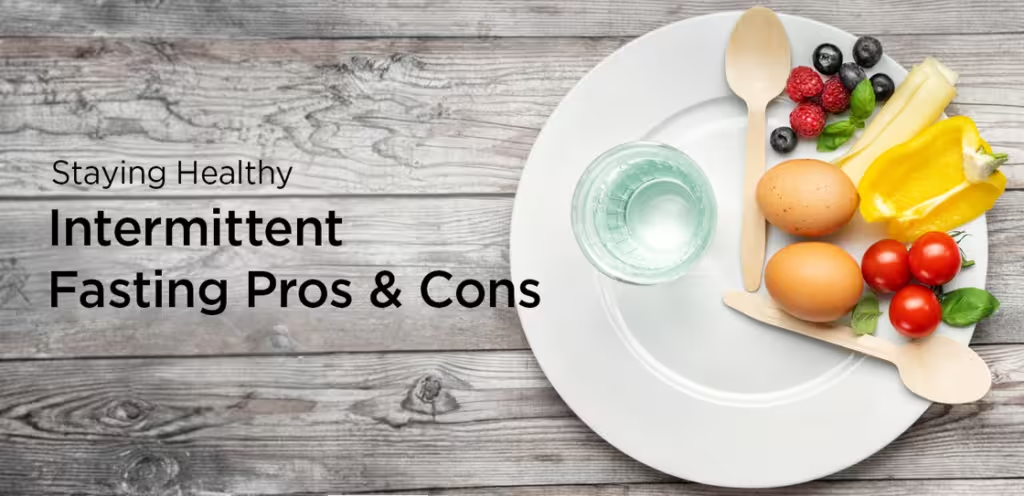
What is intermittent fasting?
Intermittent fasting is an eating pattern that cycles through set periods of eating and fasting. While most diets focus on what to eat, intermittent fasting highlights when to eat.
There are many different versions of intermittent fasting. However, all revolve around sticking to specific eating and fasting schedules. For example, one popular fasting pattern advises eating all meals within an 8-hour window. Another intermittent fasting method entails fasting for 24 hours once or twice a week.
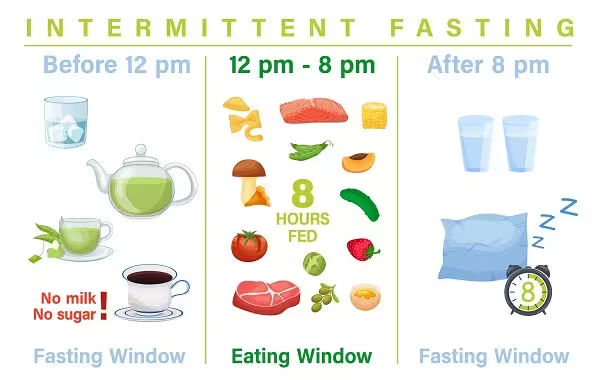
How Intermittent Fasting Works
When your body doesn’t get enough carbohydrates or calories for energy, it begins using fat cells to produce glucose for energy. Intermittent fasting prompts your body to burn stored fat for fuel since it’s not receiving carbohydrates from food. This process is referred to as “flipping the metabolic switch.
As the body breaks down stored fat, it produces ketones, also known as ketone bodies. Ketones act as an alternative fuel source when glucose is scarce. This increase in ketones in the body is known as ketosis and is the aim of the ketogenic diet. However, ketosis can also be induced by other practices, such as fasting.
“Eating three meals a day, snacking frequently, and not exercising keeps your body on a steady stream of glucose. Intermittent fasting can help your body burn through the calories of your last meal, potentially increasing fat-burning and protecting against chronic diseases like diabetes, cancer, heart disease, and obesity.”
While intermittent fasting has many benefits, it’s not for everyone. People with certain health conditions should be cautious.
Different types of Intermittent Fasting
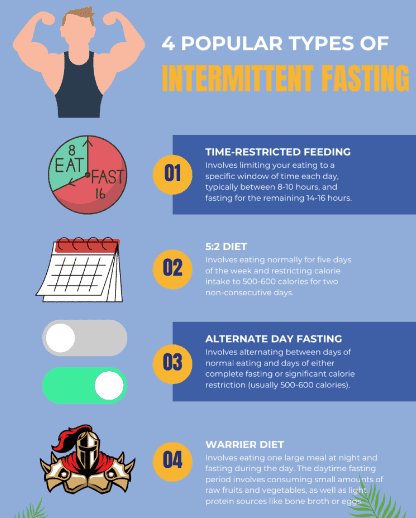
Time-restricted
This method uses set fasting and eating “windows.” The most common form of the method is 16/8, meaning you fast continually for 16 hours and only eat during the remaining eight hours. The most convenient way of doing this method is to stop eating around 7 p.m., so by the time you wake up in the morning, your fast is almost over. This method can be repeated daily or as many times per week as you like. Nothing should be consumed other than water, black coffee, and tea with no sweetener or other ingredients during the fasting period.
Alternate day fasting
This method is similar to the 5:2 method, but instead of fasting only two days a week, you fast every other day. Similar to 5:2, you limit your calories to 500 on your fasting days and eat protein- and fiber-rich foods to stay full. The other days of the week, you eat normally.
One meal a day
This method, called OMAD, involves eating one high-calorie meal within one hour and fasting for the next 23 hours. As with time-restricted fasting, nothing should be consumed other than water, black coffee, and tea with no sweetener or other ingredients during the fasting period.
Intermittent fasting involves alternating between periods of eating and periods of not eating. The duration of the fasting period can vary, with options to choose from depending on individual preferences. A fast is considered scientifically valid if it lasts 12 hours.
In time-restricted eating plans, you can choose your eating window. For instance, you may consume all meals and snacks between 10 a.m. and 6 p.m. and fast for the remaining 16 hours. Some people prefer 6-hour eating windows, while others choose 10 or 12-hour windows. This flexibility empowers you to make dietary choices that suit your lifestyle and preferences.
5:2 Method – Intense intermittent fasting:
The 5:2 method involves only eating 500 calories a day for two days a week, then eating a healthy, regular diet the other five days. Preferably, the meals on your fasting days should be high in protein and fiber to help you feel full. Your two fasting days can be any day of the week as long as a non-fasting day is between them.
Intense intermittent fasting regimens, such as the 5:2 approach, entail normal eating for five days a week and significant dietary restrictions on the remaining two days, involving a reduction of calorie intake by at least 75%. For instance, an individual consuming 2,000 calories daily would limit their intake to no more than 500 calories on these fasting days. It is important to note that this highly restrictive approach may not be suitable for everyone, and it is advisable to consult a healthcare professional before embarking on any low-calorie dietary plans to ensure your health and safety.
Intermittent fasting: Pros and cons
Intermittent fasting is effective for weight loss and improving health markers. However, it’s important to note that it may not be suitable for everyone. Before deciding to try fasting, it’s crucial to carefully weigh the potential benefits and drawbacks, ensuring you’re well-informed and prepared for the journey.

PROS:
Intermittent fasting has a significant advantage: it’s easy to follow! There is no need to track meals or count calories meticulously. It seamlessly fits into your lifestyle.”
Furthermore, research indicates fasting can have positive effects on health. Extensive studies in animals and some in humans demonstrate many potential benefits for heart health and overall well-being. These benefits comprise:
It Can Help You Lose Weight
The process of fasting supports ketogenesis, enabling the body to utilize stored fat as an energy source rather than glucose. Intermittent fasting has been found to elevate Human Growth Hormone (HGH) levels, which is associated with both fat reduction and muscle growth. A study on alternate-day fasting revealed that participants achieved an average 8% reduction in body fat over a period of eight weeks!
It Reduces Insulin Resistance
Research indicates that intermittent fasting can effectively reduce insulin levels and enhance insulin sensitivity in individuals at risk of developing diabetes. A study involving participants with type 2 diabetes demonstrated that fasting led to notable weight loss and a substantial decrease in blood sugar levels.
It Can Reduce Inflammation
Chronic inflammation is the root cause of nearly every modern illness, including diabetes, obesity, heart disease, Alzheimer’s, autoimmune disease, and cancer. However, there’s good news! Studies definitively show that fasting lowers levels of systemic inflammation and pro-inflammatory cytokines. It also indisputably reduces oxidative stress, helping your body combat harmful free radicals.
It Can Lower the Risk of Heart Disease
Research shows that intermittent fasting can decrease several risk factors associated with heart disease. For instance, in one study, intermittent fasting led to reductions in body weight, body fat, LDL cholesterol, triglycerides, and blood pressure. Fasting also raises levels of adiponectin, a hormone with cardioprotective solid properties.
It Supports Brain Health
Intermittent fasting has been found to have benefits for not just the heart but also for the brain. Research indicates that intermittent fasting can elevate the levels of brain-derived neurotrophic factor (BDNF), which could potentially facilitate the growth of new neurons. Low levels of BDNF have been associated with depression, cognitive decline, and impairment. While further research is necessary, the anti-inflammatory effects of fasting might offer protection against neurodegenerative diseases like Alzheimer’s.
It is Anti-Aging
Intermittent fasting leads to changes in gene expression that promote longevity and reduce the risk of chronic illness. How does this work? Fasting triggers autophagy, the body’s internal cleaning system. During autophagy, the body eliminates aging or damaged cells and recycles parts for cellular repair.
It Promotes Longevity
Increased autophagy may delay aging and extend lifespan. One animal study found that fasting increased the lifespan of rats by up to 83%!
CONS:
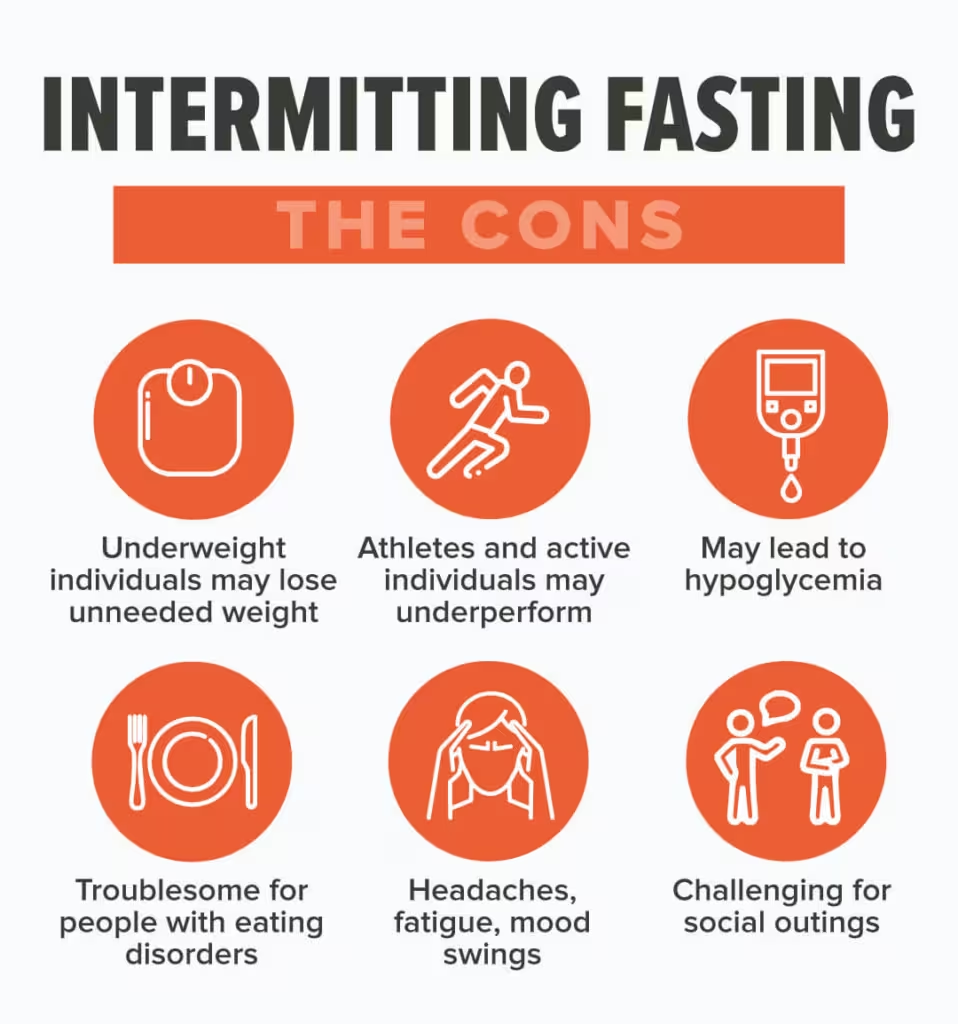
Intermittent fasting holds promise, although it may not be suitable for everyone. While the research has mainly involved animals, the implications for human health remain uncertain. Early studies have primarily focused on the more extreme 5:2 diet, yet researchers are continuing to explore the potential benefits of restricting eating to 8 or 12 hours a day.
Recent research involving over 20,000 U.S. adults indicated that individuals who restricted their eating to less than 8 hours per day had a higher risk of cardiovascular disease-related mortality compared to those who spread their eating across 12 to 16 hours per day. It’s important to note that this data is from preliminary research presented at the 2024 American Heart Association’s Epidemiology, Prevention Lifestyle, and Cardiometabolic Scientific Sessions and has not yet been published in a peer-reviewed scientific journal. As always, it’s essential to seek advice from a medical professional before making any changes to your lifestyle.
Intermittent Fasting Safety
Although intermittent fasting does have a variety of impressive health benefits, it’s not for everyone. Talk with your medical doctor before beginning intermittent fasting if you have any of the following conditions:
- Diabetes or trouble regulating blood glucose levels: Individuals with diabetes must eat regularly to keep their blood sugar levels stable. If you have diabetes, intermittent fasting can lead to a significant drop in your blood sugar levels, which can be dangerous.
- Low blood pressure: Studies indicate intermittent fasting can reduce blood pressure, which may pose risks for individuals with already low blood pressure.
- Are underweight: If you are underweight, you must consume enough calories consistently to maintain your energy levels.
- Take certain medications: Please be cautious if taking diabetes, blood pressure, or thyroid medications. Fasting can affect the way your body absorbs these medications. Additionally, many medications are meant to be taken daily with meals. Taking them while fasting can change how your body absorbs the medication and may lead to increased adverse side effects.
- History of eating disorders: We’ve already mentioned this, but it’s worth repeating: If you have a history of disordered eating, please avoid fasting. Intermittent fasting might lead to unhealthy eating behaviors like over eating.
- Trying to conceive children: Hold off on intermittent fasting if you’re trying to get pregnant, as it may impact fertility and menstruation.
- Are pregnant or breastfeeding: It can be difficult to obtain the necessary nutrition for you and your baby when you have limited eating windows. Growing or feeding a baby requires a significant amount of energy. Limiting your nutrition through fasting may hinder your baby’s development.
Other side effects
Other side effects can include insomnia, irritability, headaches, and nausea. For many, IF also may not be sustainable for the long term. Some may find it challenging to fast while balancing family and social obligations. It’s important to note that intermittent fasting can be dangerous for some people. If you have an eating disorder, fasting can cause an increase in overeating. It’s advised that children don’t practice IF because fasting can affect growth hormones and because they’re still learning healthy eating habits. IF is also not recommended for pregnant or breastfeeding women and people with hypoglycemia, acid reflux, kidney stones, or diabetes.
Since intermittent fasting isn’t safe for everyone, you should always check with your doctor before starting it.
Michelle O’Donoghue, a cardiologist from Mass General Brigham, discussed this research and its implications for patients with Boston 25 News. “The key takeaway for people doing intermittent fasting is: don’t panic,” says Dr. O’Donoghue. “This study is not definitive, and it doesn’t talk about cause and effect…Nonetheless, it raises some questions about the safety of intermittent fasting.”
Dr. O’Donoghue adds, “There have been some intriguing studies suggesting that a pattern of intermittent fasting may improve your blood pressure, improve your cholesterol, and lead to weight loss. But at the end of the day, it’s more about what you eat rather than the eating pattern.”
If fasting sounds intimidating, avoid snacking between meals, especially late-night snacking. This can help give your body time to recover between meals.
Tips for Intermittent Fasting:
If you want to give intermittent fasting a try, these tips will get you started:
Think about your lifestyle: If you value family dinners, it’s not practical to begin fasting every day at 3 p.m. Consider which option aligns best with your lifestyle.
Read up: What are your goals for fasting: to lose weight, live longer, control your blood sugar? Educate yourself so you can choose the approach that makes sense for you.
Eat well: It’s important to keep in mind that intermittent fasting shouldn’t be seen as a replacement for balanced and healthy eating habits. It’s not about indulging in unhealthy foods during your eating window. Instead, focus on consuming a variety of fruits and vegetables, whole grains, and lean protein. Neglecting healthy eating while fasting may lead to nutritional deficiencies, so it’s essential to prioritize a well-rounded diet.
Drink up: Make sure you drink plenty of water when fasting so you don’t get dehydrated.
Plan ahead: Slim180 recommends planning and prepping meals ahead of time, so you have healthy foods ready to grab when you’re hungry. That way, you’ll be less likely to fill up on snacks once your eating window opens.
Don’t overdo it: Individuals should be cautious about following intermittent fasting diets that advocate eating just one meal a day, emphasizing the potential difficulty of obtaining essential vitamins, minerals, and nutrients under this plan. Similarly, we advise that the widely known 5:2 plan may not be suitable for everyone, underscoring the importance of consulting with a doctor before attempting any extreme approaches to intermittent fasting.
Ease in: Don’t worry if you’re interested in intermittent fasting but concerned about going without food for too long. You can start small by eating during a 12-hour window and then fasting for 12 hours. Or you can take an even smaller step by avoiding snacking between meals and late-night snacking. This gives your body time to recover between meals and can be an easy way to ease into fasting.
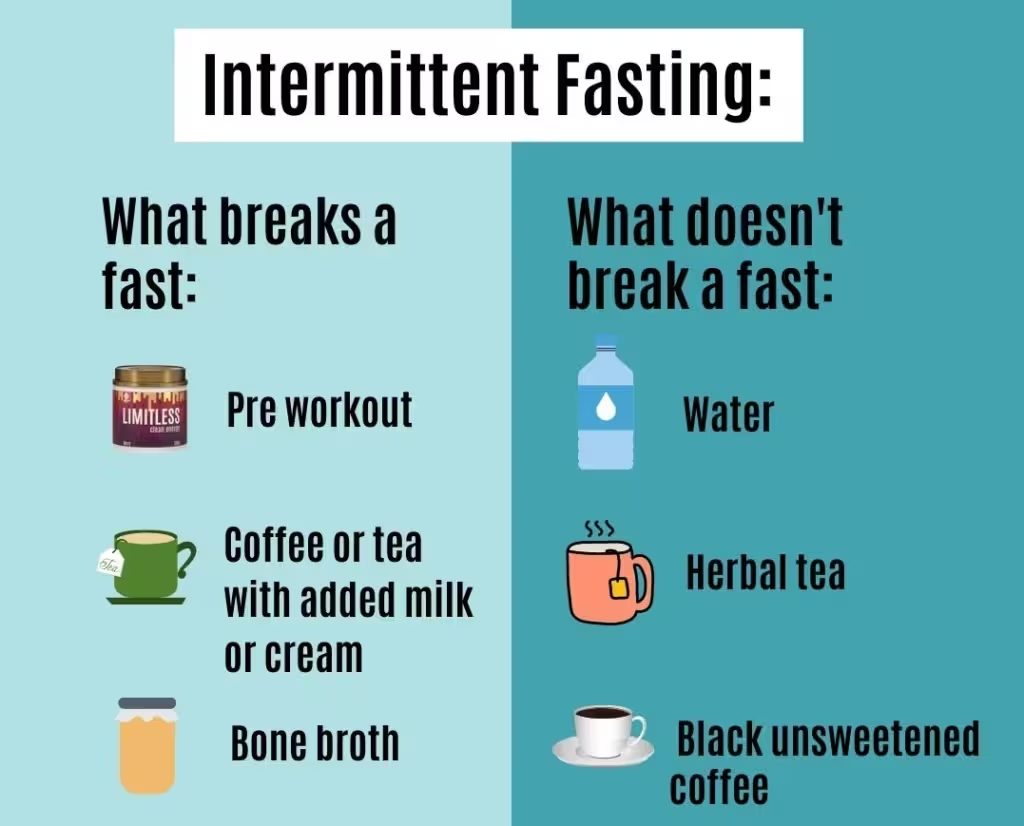
REMINDER
Before changing your diet significantly, it’s best to consult your doctor, especially if you are on medication or have health issues. For most people, fasting for 12 to 14 hours is safe, provided that healthy food choices are made. Intermittent fasting can be a helpful tool for starting a healthier lifestyle.
